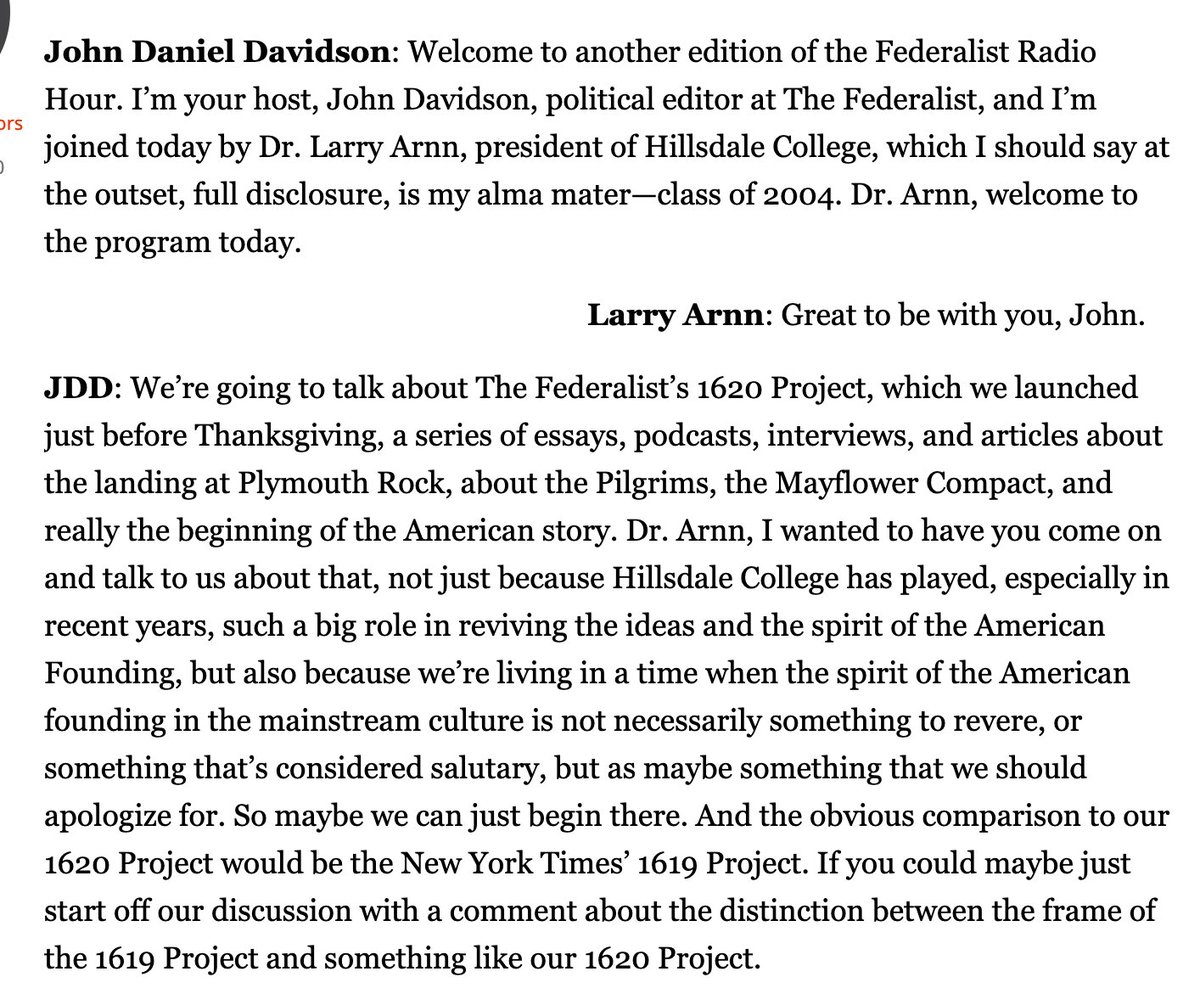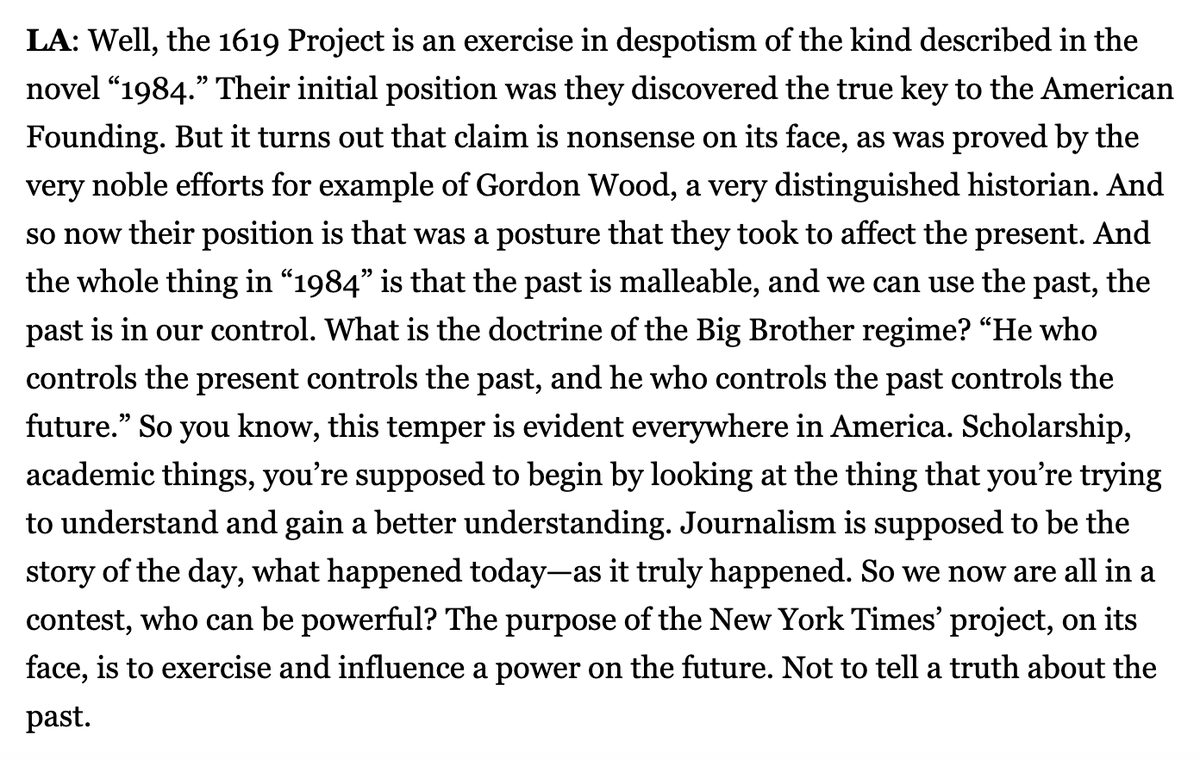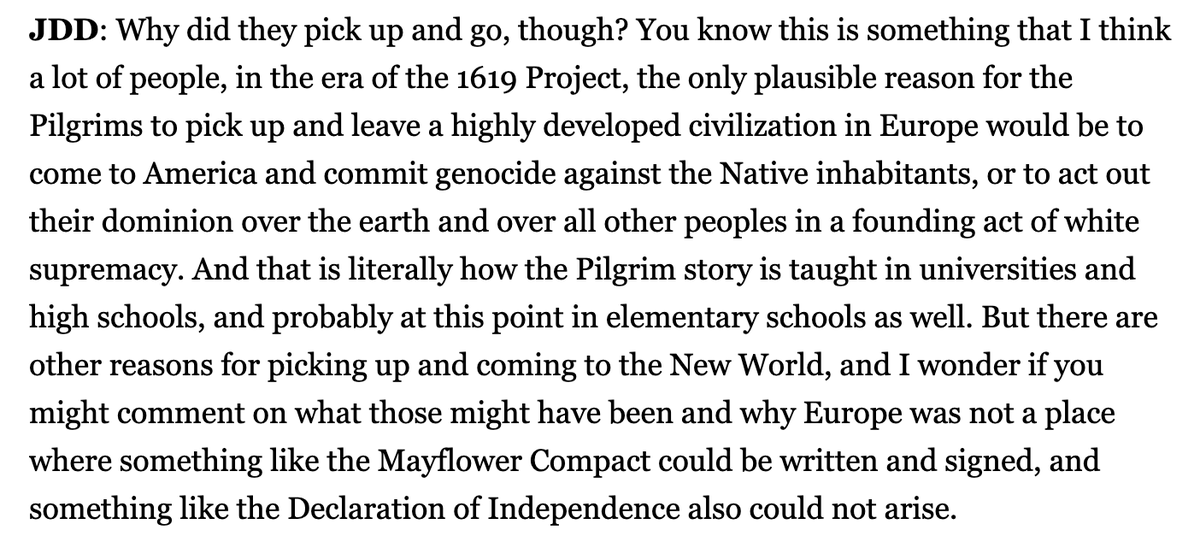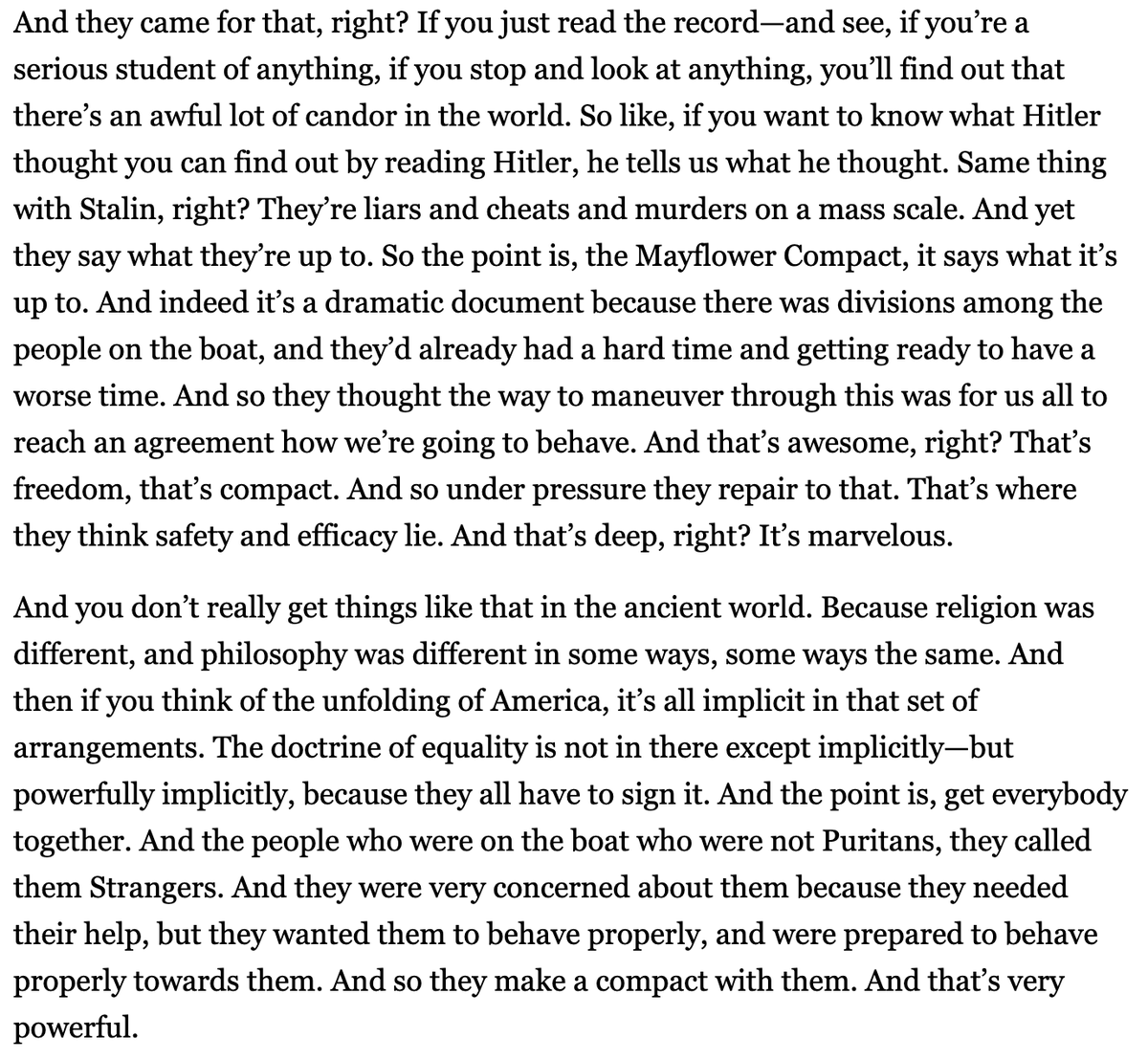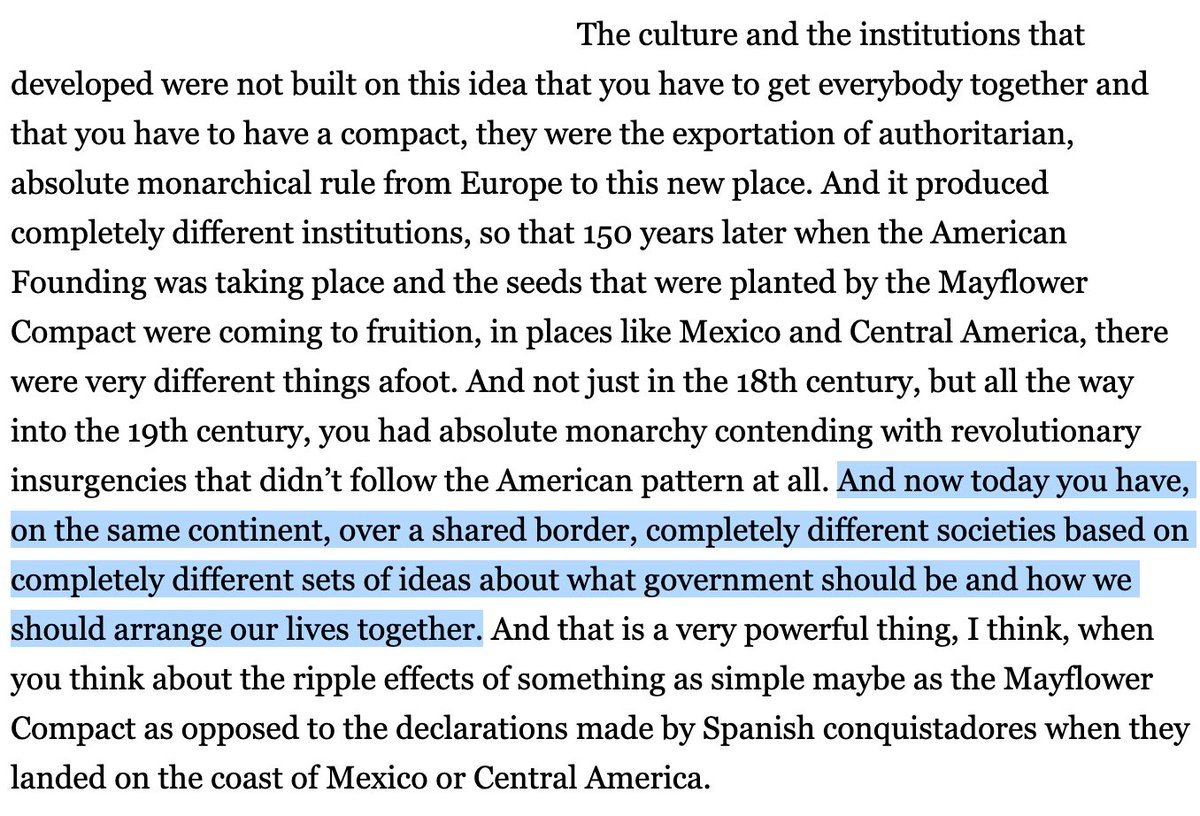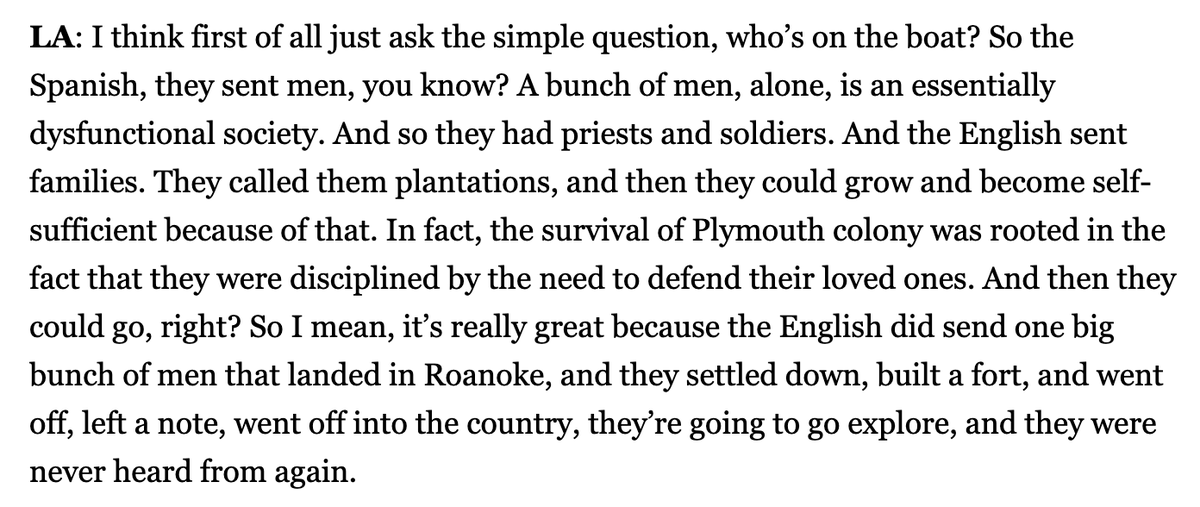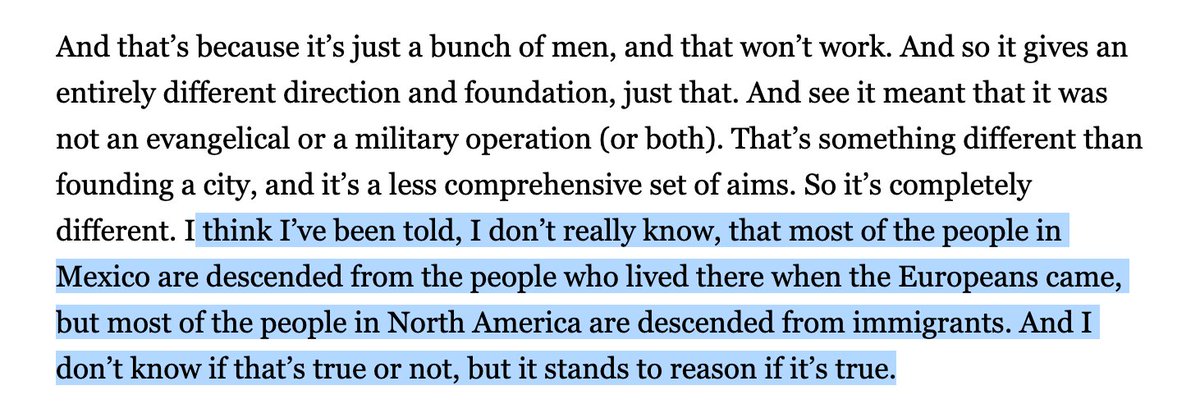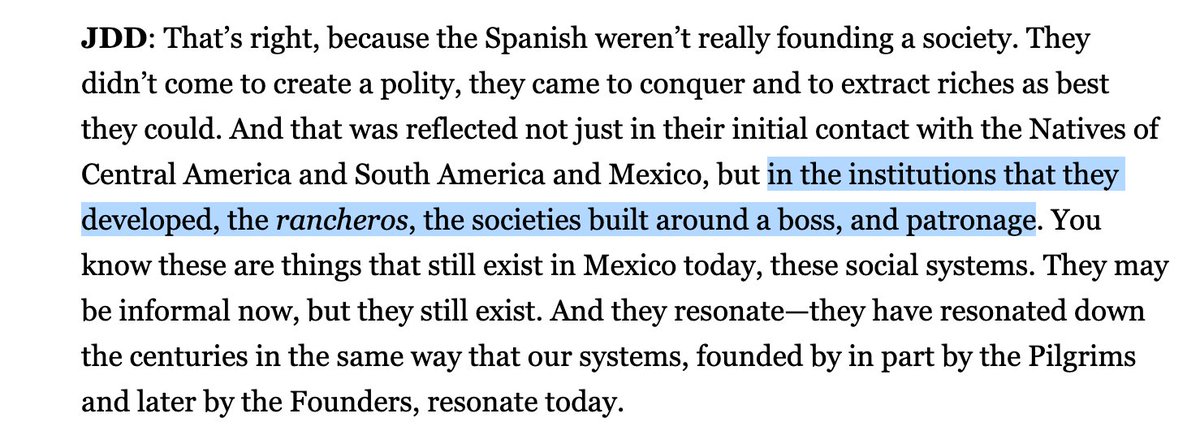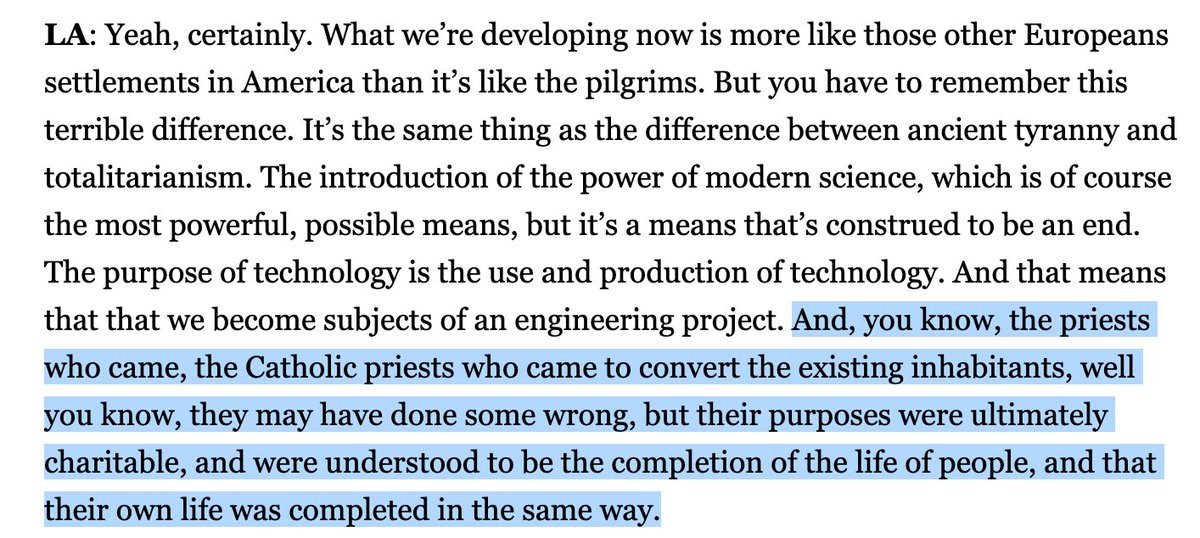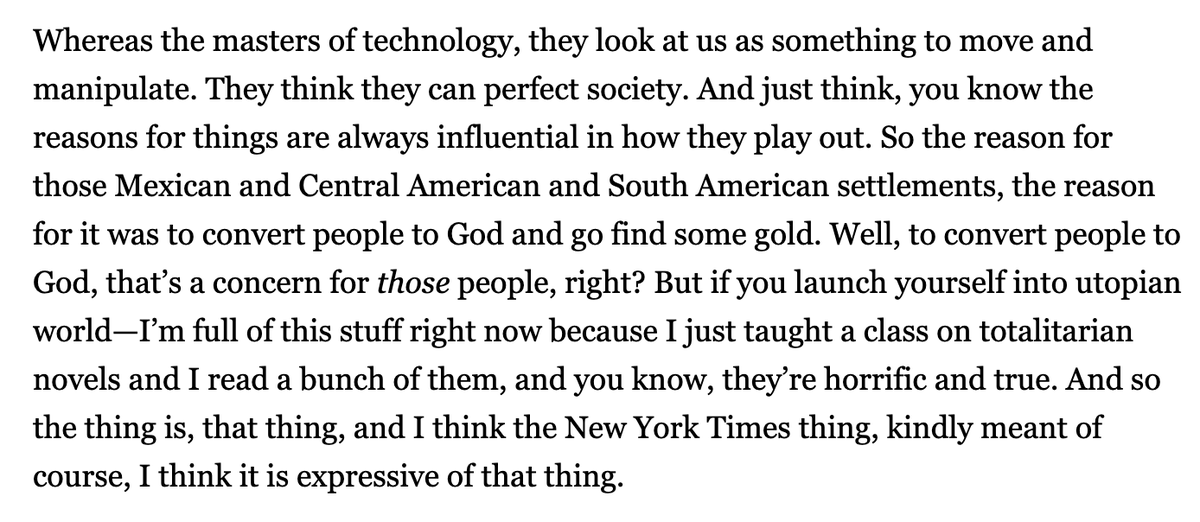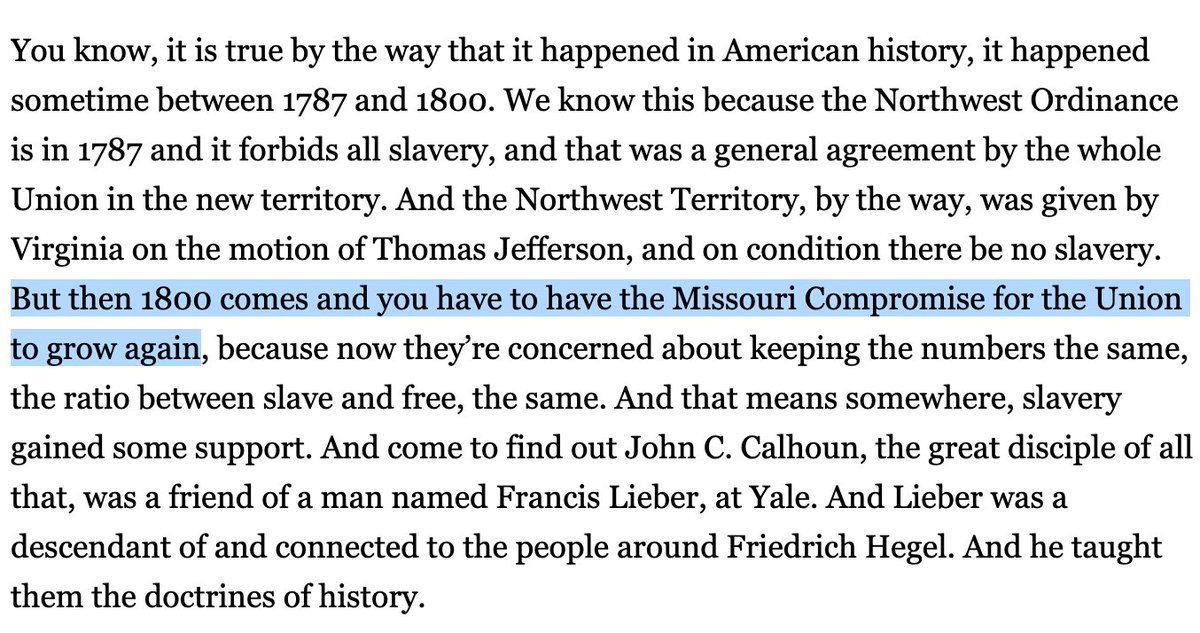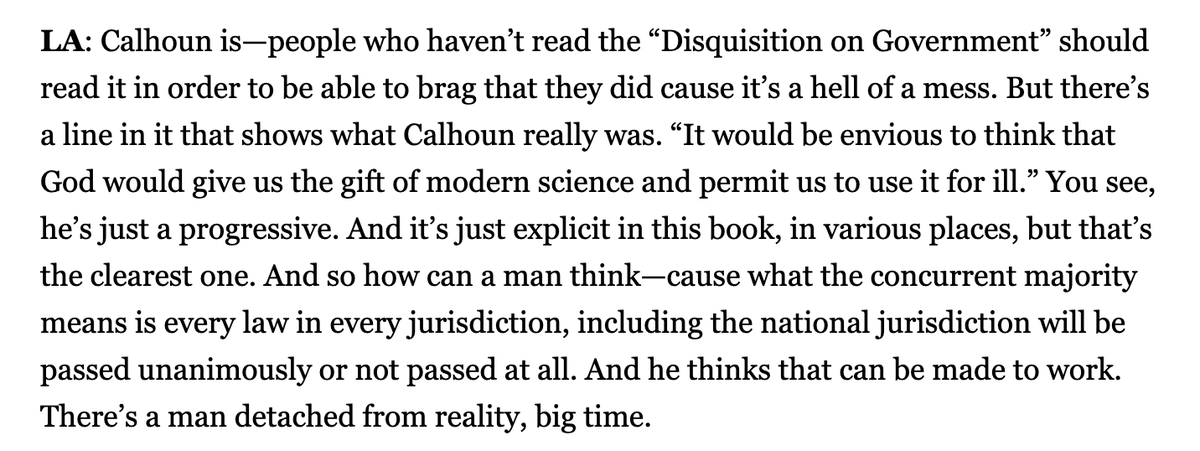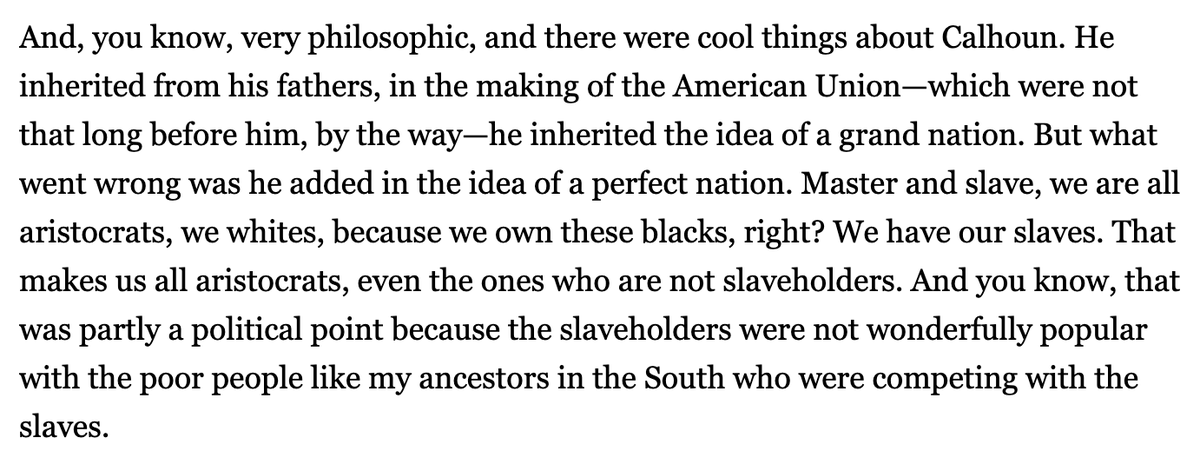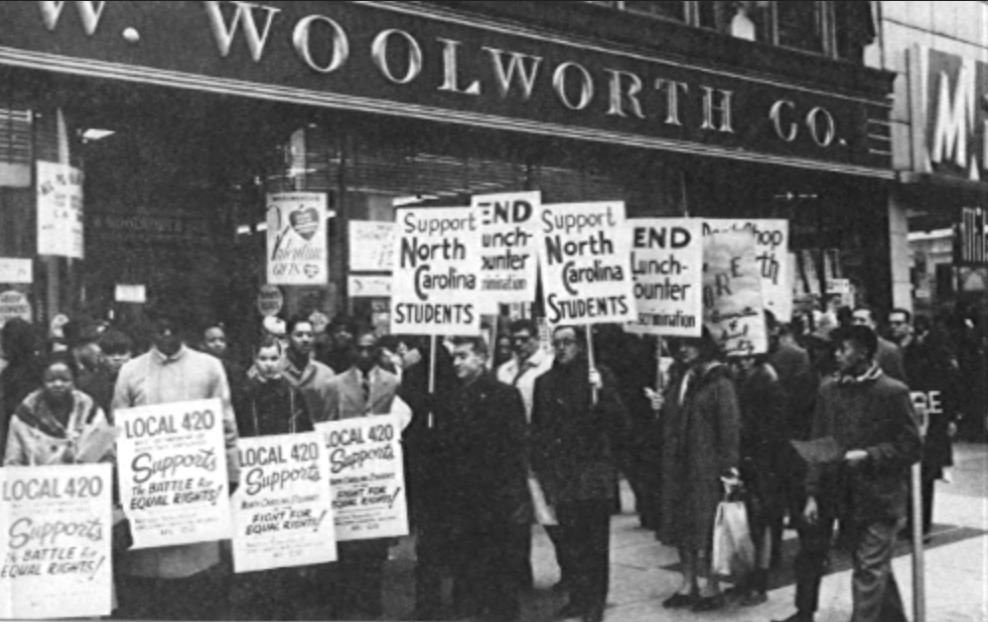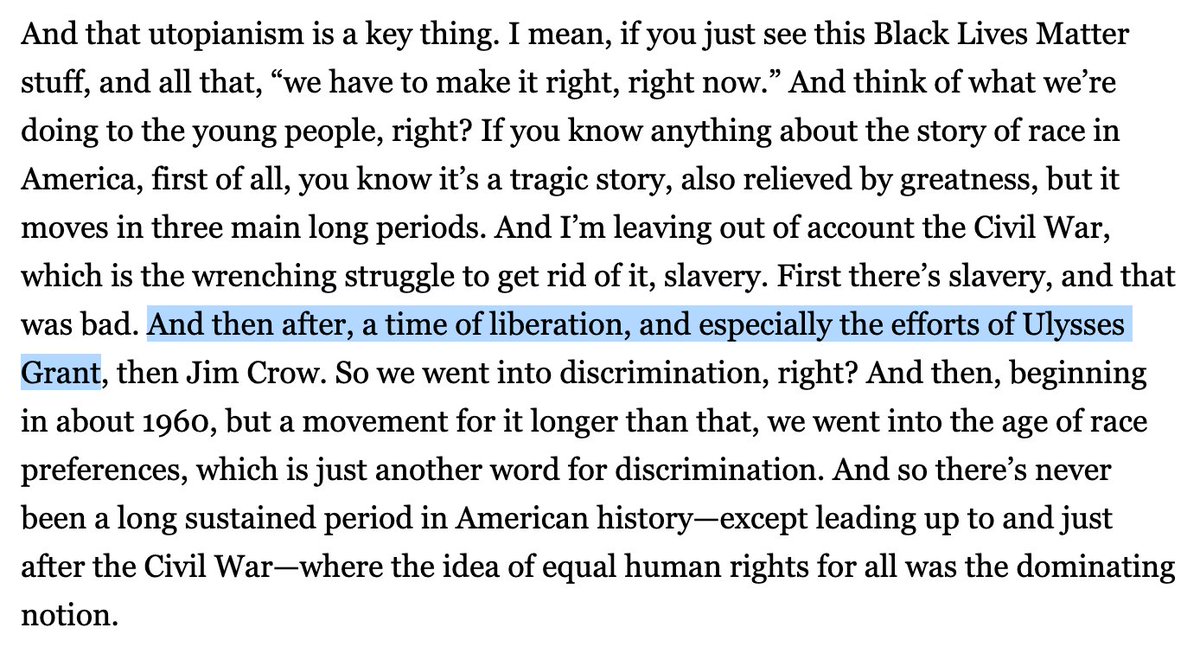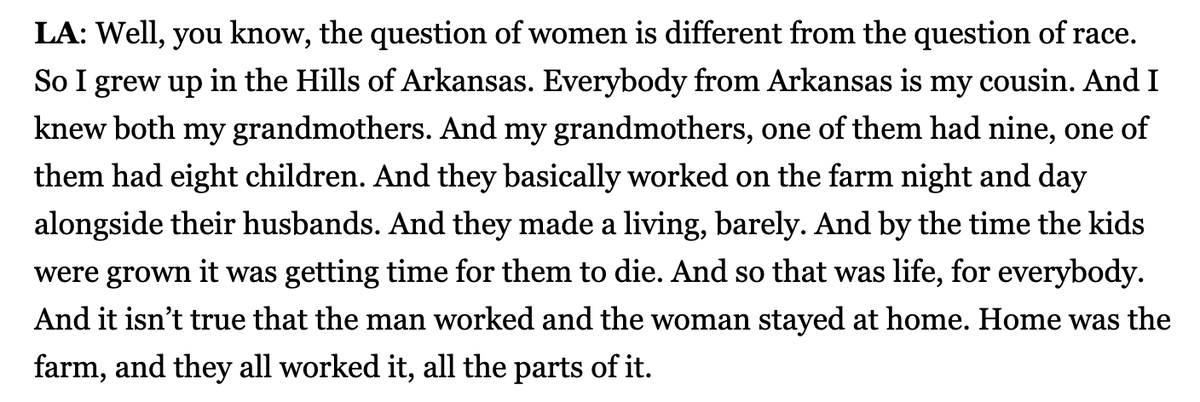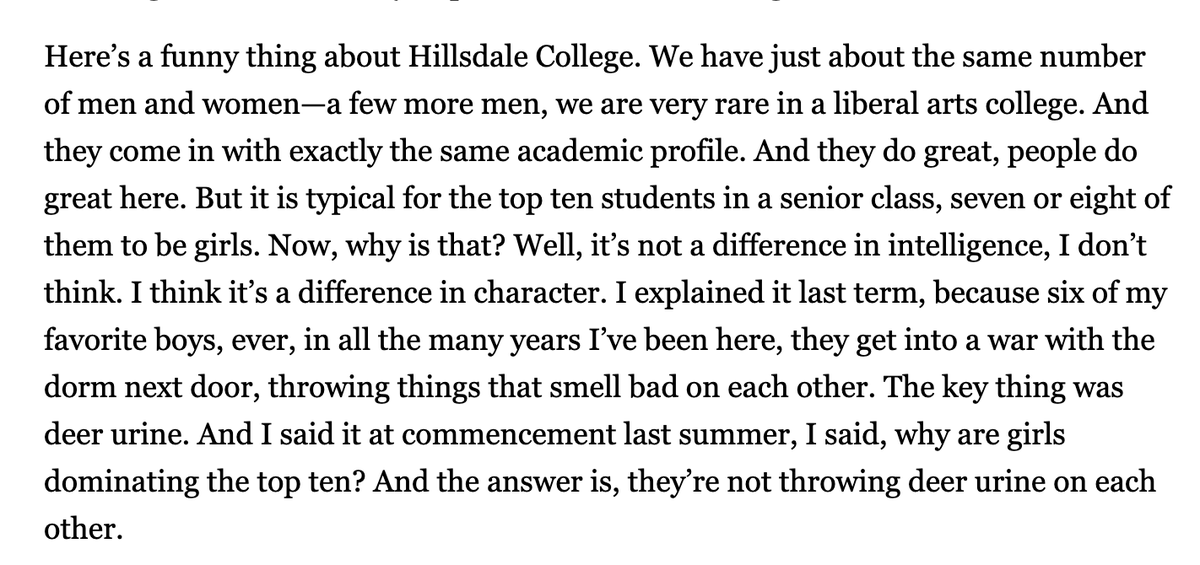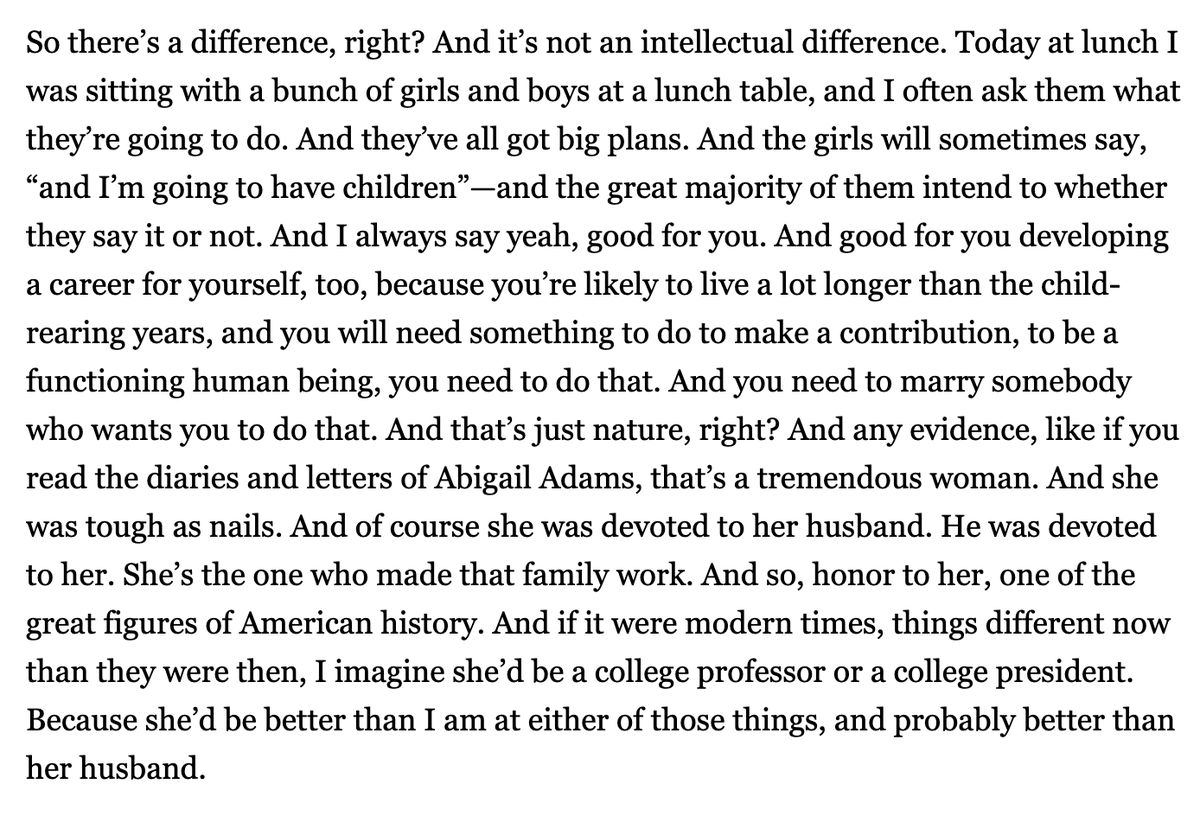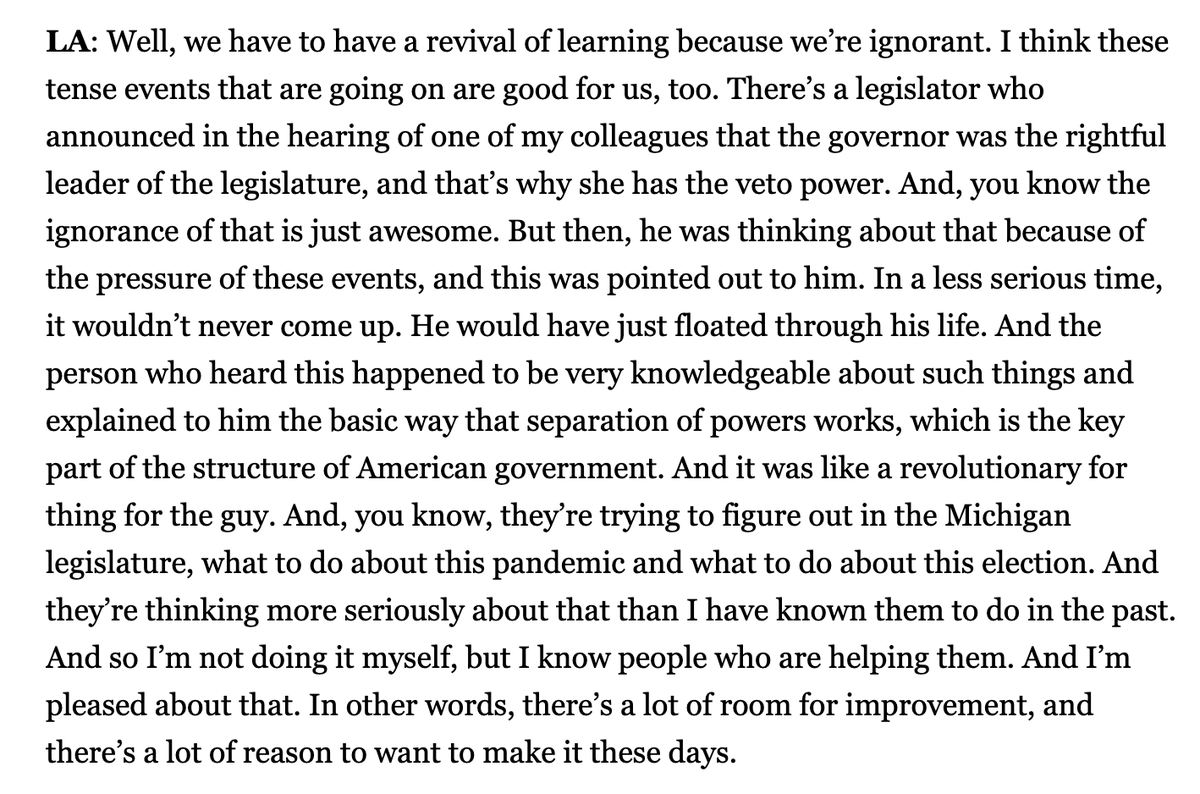h/t to @RhetoricPJ for the heads-up about this interview with Hillsdale College's president about American history, because it's a doozy.
Shall we dive in? https://thefederalist.com/2020/12/15/pilgrims-totalitarians-and-babies-a-conversation-with-hillsdale-colleges-larry-arnn/
Shall we dive in? https://thefederalist.com/2020/12/15/pilgrims-totalitarians-and-babies-a-conversation-with-hillsdale-colleges-larry-arnn/
Apparently this piece was made possible by the 1620 Project, the far right's answer to the 1619 Project.
And I'm honestly not even going to touch any of this. The right's position on the 1619 Project is familiar to all of us by now.
And I'm honestly not even going to touch any of this. The right's position on the 1619 Project is familiar to all of us by now.
Instead, I'm going to focus in this thread on what The Federalist and Hillsdale prez Larry Arnn say about history and how they perceive it, because -- as I said -- it's a doozy.
And very, very revealing.
And very, very revealing.
The basic problem is that Arnn shows a complete lack of interest or understanding of history outside of the confines of the narrative he's trying to tell -- which is your standard amalgam of American/Christian exceptionalism we're all pretty much familiar with.
That leaves him with some pretty glaring blind spots, like claiming that the Pilgrims did something that never happened before in history, by moving from a "highly developed civilization" to a "new place."
Settler colonialism. He's describing settler colonialism.
Settler colonialism. He's describing settler colonialism.
The problems with this claim are twofold.
One, not only does settler colonialism pre-date the Columbian Exchange -- the Romans practiced a version of it! -- but the Plymouth Colony WASN'T EVEN THE FIRST ATTEMPT AT SETTLER COLONIALISM BY THE ENGLISH IN THE AMERICAS!
One, not only does settler colonialism pre-date the Columbian Exchange -- the Romans practiced a version of it! -- but the Plymouth Colony WASN'T EVEN THE FIRST ATTEMPT AT SETTLER COLONIALISM BY THE ENGLISH IN THE AMERICAS!
Two, settler colonialism did not END with the Pilgrims.
Even if we were to incorrectly, ahistorically, and offensively define settler colonialism as "the settlement by European colonizers of 'wild' or 'empty' lands"--which is essentially what Arnn does--there's AUSTRALIA!
Even if we were to incorrectly, ahistorically, and offensively define settler colonialism as "the settlement by European colonizers of 'wild' or 'empty' lands"--which is essentially what Arnn does--there's AUSTRALIA!
Also, it's pretty weird to use THE MAN WHO SHOT LIBERTY VALANCE as a piece of evidence when talking about the Pilgrims, but again, this is the president of a right-wing college and we already know what the narrative here is.
There are occasional glimmers of potential insight. The Federalist asks why Europeans came to the Americas in the first place.
This is not an unreasonable question and could be the basis for thoughtful conversation -- at least, if it also weren't framed as genocide denial.
This is not an unreasonable question and could be the basis for thoughtful conversation -- at least, if it also weren't framed as genocide denial.
Arnn's answer, unfortunately, is a rambling response about Christian exceptionalism that, aside from a stray comment about shipboard practices on the "Mayflower," says *NOTHING* about the political, social, or religious context of Europe in 1620.
Again, the almost complete lack of curiosity about the past is striking.
Now we're getting into the comparative part of the interview with The Federalist mentioning the Spanish empire in the Americas, and buckle up because this section gets even rockier.
First, let's just stipulate that the entire purpose of this question is to Other -- in a high-minded, intellectual way, although we'll see how long that facade lasts -- Latin America as essentially another civilization than the Anglo United States.
One, the Spanish didn't JUST send men.
Two, Spanish colonialists DID often have families with indigenous women.
Three, most English settlers were ALSO men, especially in Virginia.
Four, the Roanake Colony -- infamously -- had women and children!
Two, Spanish colonialists DID often have families with indigenous women.
Three, most English settlers were ALSO men, especially in Virginia.
Four, the Roanake Colony -- infamously -- had women and children!
(You'd think the president of Hillsdale College would've heard of Virginia Dare before...)
Moving right along, Arnn adds that -- although he doesn't actually have any idea if this is true -- "most people" in Mexico are the descendants of the indigenous population, whereas in the United States most people are the descendants of immigrants.
Setting aside everything else about this -- and insofar as this is true in Mexico, it's not necessarily the case in every country in Spanish-speaking America *cough* Argentina *cough*...
... it also implies that perhaps there might be other reasons beyond just "there were no European women" in the English-speaking European colonies.
But to follow up on that point would be to engage with the genocide argument, so Arnn leaves it there.
But to follow up on that point would be to engage with the genocide argument, so Arnn leaves it there.
I've taught global history before. I've had my students read the Constitution of Carolina written by John Locke.
The implication that it was only the Spanish who were economic imperialists is so easily falsifiable by even a cursory read of the evidence it's basically just a lie.
The implication that it was only the Spanish who were economic imperialists is so easily falsifiable by even a cursory read of the evidence it's basically just a lie.
It's also a recapitulation of the "Spanish Black Legend," the rather self-serving narrative promulgated by Dutch, English, and later American writers that the Spanish Empire in the Americas was *uniquely* cruel and barbarous. https://en.wikipedia.org/wiki/Black_legend_(Spain)#Conquest_of_the_Americas
The issue here is "uniquely."
The Spanish Empire inflicted almost unspeakable cruelty upon its subject populations in the Americas... but this was not terribly distinct from English, French, or Dutch practices -- either in terms of genocidal violence or slavery.
The Spanish Empire inflicted almost unspeakable cruelty upon its subject populations in the Americas... but this was not terribly distinct from English, French, or Dutch practices -- either in terms of genocidal violence or slavery.
Let's also not overlook the subtle anti-Catholicism in the way The Federalist frames "patron-client" relationships as a Latin thing.
Two things jump out:
One, client-patron relationships are literally endemic in American history.
Even if we set aside how this was the preferred framework that slaveowners articulated for themselves -- and we absolutely should NOT...
One, client-patron relationships are literally endemic in American history.
Even if we set aside how this was the preferred framework that slaveowners articulated for themselves -- and we absolutely should NOT...
...this was also how much of American politics functioned from the very get-go!
It obviously was a major component of Jacksonian democracy, but predates it.
It obviously was a major component of Jacksonian democracy, but predates it.
Two, this taps into longstanding anti-Catholicism in American history -- the idea that Catholics have a unique, authoritarian relationship with the Pope.
I'm honestly having a hard time following Arnn here. He starts with an out-of-left-field comment about modern science as a force in social engineering, and ends with some half-assed Sepulveda.
I'm really struggling to find the thread here. Arnn appears to be comparing the Spanish Empire in the Americas to utopia -- which from the context, he seems to be referring to More's UTOPIA without naming it, so... fair enough, I guess? -- but then ends with totalitarianism?
I mean, really, it's just a grab bag of various pathologies of the American right. Moving along...
Skipping ahead because Arnn spends several paragraphs making a strained 1984 analogy -- this prompted by a question about New Spain.
Again, this is another prime example of Arnn's complete and utter disinterest in history, and his difficulties in understanding basic historical concepts.
Slavery -- and this is something the 1619 Project makes clear -- was an *system of production.*
It was obviously more than just that, but that is, at the very basic level, the point of forced labor.
It was obviously more than just that, but that is, at the very basic level, the point of forced labor.
Chronology is important here. The 1619 Project was called the 1619 Project because the first enslaved Africans in the Colony of Virginia arrived in 1619.
The colony was settled in 1607.
The colony was settled in 1607.
This is why the 1620 Project is framed the way it is, and why Arnn is so insistent that the English in America were not motivated by petty profits, unlike the Spanish.
Because if that WERE true (and it is -- that's how empire works) then it would actually provide a handy explanation for the spread of slavery as a system of production.
Moving on to the next paragraph...
One, and this is a seemingly minor point that is actually incredibly revealing... Arnn gets the date of the Missouri Compromise wrong.
It's 1820, not 1800.
One, and this is a seemingly minor point that is actually incredibly revealing... Arnn gets the date of the Missouri Compromise wrong.
It's 1820, not 1800.
It's particularly cavalier considering that Arnn's thrust throughout the entire interview is that American history specifically is unique and something to revere, but he can't even be bothered to get the dates right!
And not to reopen old debates, but it's pretty rich that Nancy MacLean got so much grief for linking John C. Calhoun to contemporary libertarianism, and here is Arnn blaming Hegel for John C. Calhoun!
We've already established that Arnn has problems understanding chronology, but the idea that Hegel is responsible for the ideological underpinnings of American slavery through the master-slave dialectic is a truly galaxy-brained take.
PHENOMENOLOGY OF THE SPIRIT, incidentally, was written in 1807, which is to say 200 years *after* the introduction of African slavery to Virginia.
And just spitballing here, but perhaps there were other, more recent events that might have influenced Hegel.
Like Haiti.
And just spitballing here, but perhaps there were other, more recent events that might have influenced Hegel.
Like Haiti.
Again, Arnn's complete and utter lack of curiosity about the world is astounding.
Having read a bit of the "John C. Calhoun was actually a leftist" literature myself, basically all of it is derived from Hofstadter's "Marx of the Master Class."
Not derived from the actual essay, which opens with Hofstadter calling Calhoun a reactionary who had a sociological understanding of history and historical forces -- an American de Maistre, in essence -- but from the title.
"Marx of the Master Class" Guess he was a Marxist!
"Marx of the Master Class" Guess he was a Marxist!
Arnn's thoughts on Calhoun and progressivism don't even have the dignity of being wrong. They're just lazy.
"Calhoun believed in modern science? You see?!?! YOU SEE?!?! He's just a progressive!"
"Calhoun believed in modern science? You see?!?! YOU SEE?!?! He's just a progressive!"
I mean, this passage isn't even fun to dunk on, because it doesn't even make internal sense!
I really am struggling to find the coherent point here.
Calhoun was good because he believed in America as a "grand nation," which is good, but he's bad because he believed in America as a "perfect nation," which is bad, and also because he was a Hegelian, which is bad...
Calhoun was good because he believed in America as a "grand nation," which is good, but he's bad because he believed in America as a "perfect nation," which is bad, and also because he was a Hegelian, which is bad...
I think the "inherited from his fathers" line is the key point.
Calhoun, in Arnn's narrative, is a European-influenced aberration from genuine Americanness.
Calhoun, in Arnn's narrative, is a European-influenced aberration from genuine Americanness.
I said I wasn't going to do this, but I think it's useful to step back and think a little bit about why the 1619 Project enraged conservatives so much.
I wrote about it here for @BostonReview last year. http://bostonreview.net/race-politics/david-walsh-fragile-patriotism-american-conservative
I wrote about it here for @BostonReview last year. http://bostonreview.net/race-politics/david-walsh-fragile-patriotism-american-conservative
The basic thrust of my article is that conservatives (like Arnn, in this case) view history as both something to be revered and as a source of authority.
Not, critically, as something to be interrogated.
Not, critically, as something to be interrogated.
In religious terms, the 1619 Project enraged so many conservatives because it centered slavery as America's "original sin," something which has inexorably affected the subsequent 400 years of American history.*
For Arnn -- and for most other white Christian nationalists -- America was born in a state of grace.
That's why Arnn's narrative of American history begins in Massachusetts, not Virginia.
It's also why he absolutely refuses to acknowledge the genocide of Native Americans.
That's why Arnn's narrative of American history begins in Massachusetts, not Virginia.
It's also why he absolutely refuses to acknowledge the genocide of Native Americans.
It's also why "the fall" had to come from elsewhere, from foreign influences.
Thus, Calhoun not only is not an expression of an authentic American political tradition, he *necessarily* has to be a Hegelian, which is to say a European, which is to say a Marxist.
Thus, Calhoun not only is not an expression of an authentic American political tradition, he *necessarily* has to be a Hegelian, which is to say a European, which is to say a Marxist.
There's a lot to unpack here, too.
I'm only going to focus on two points.
One is that Arnn condemns the entire civil rights movement. He says that Jim Crow was "bad," but then, starting in 1960 (or thereabouts) we saw a new wave of "race preferences."
I'm only going to focus on two points.
One is that Arnn condemns the entire civil rights movement. He says that Jim Crow was "bad," but then, starting in 1960 (or thereabouts) we saw a new wave of "race preferences."
The paradox here is that Arnn goes out of his way to praise Ulysses S. Grant.
If you just read this sentence and not the rest of the paragraph -- or for that matter the entire interview -- you'd read this as Arnn praising Reconstruction!
If you just read this sentence and not the rest of the paragraph -- or for that matter the entire interview -- you'd read this as Arnn praising Reconstruction!
The only way I can make sense of this paragraph is through agency.
Who has the agency in "the time of liberation"? Not enslaved peoples themselves, but Ulysses S. Grant.
Who has the agency in the civil rights movement that Arnn condemns?
Who has the agency in "the time of liberation"? Not enslaved peoples themselves, but Ulysses S. Grant.
Who has the agency in the civil rights movement that Arnn condemns?
Arnn's repeated insistence that he comes from poor white country stock who never owned slaves themselves -- and who knows if that's actually true; there's a lot of... selective memory on this issue among Southern whites -- actually explains a lot of his thinking.
It's kind of a weird variant of some of the posturing of the Southern Agrarians that substantively defends racial hierarchies in America without explicitly doing so, offering muted criticism of Calhoun and the planter class alongside attacks on the Black freedom struggle.
Chronology matters.
What The Federalist does here is condense nearly 200 years of history into two narrow talking points -- the Mayflower Compact! The Declaration of Independence! -- and declares the entire period of 1619-1789 as "The Founding."
What The Federalist does here is condense nearly 200 years of history into two narrow talking points -- the Mayflower Compact! The Declaration of Independence! -- and declares the entire period of 1619-1789 as "The Founding."
Every single semester, I always have undergrads who say to me, "we didn't cover this stuff in high school!"
And that's because I'm not indoctrinating them in evil Hegelian Marxism. It's because we actually cover material that goes beyond these narrow narratives!
And that's because I'm not indoctrinating them in evil Hegelian Marxism. It's because we actually cover material that goes beyond these narrow narratives!
This is actually an important point -- it's frankly the first decent historical point that Arnn has made in this entire interview, although he doesn't suss out the full implications of it:
"Separate gender spheres" is not universally true across time and space.
"Separate gender spheres" is not universally true across time and space.
[This is a pet peeve of mine with many student papers -- high school students are still generally taught women played little to no economic or political role in America before the 1920s, which is... not true at all.]
The problem is that Arnn trips over himself in the next paragraph to reify both patriarchy and traditional gender roles.
@RhetoricPJ is right: this interview really is fascinating for those looking for insight on the Christian right's potentiality for criticism of masculinity.
Because that's substantively what this is.
Because that's substantively what this is.
This last section really is quite fascinating, because the substantive move that Arnn is making here is calling for a kind of "liberated" republican motherhood -- which is *EXACTLY* the dominant vision of femininity on the Christian right, and has been for decades.
I'll end by noting it is remarkable that in Arnn's final comments -- where he touches on Michigan for the first time -- what sticks in his craw is not the armed takeover of the Capitol by militants but that someone incorrectly said the governor is the head of the legislature.
I'll end this thread by noting that Arnn's views matter, because he is the president of one of the major right-wing universities in the United States and has been for over 20 years.
And that his views are also basically hegemonic among many people with real power... such as the donors who got @garrett_felber fired at Ole Miss this week for challenging their self-serving historical narratives. https://twitter.com/garrett_felber/status/1339063145822744576?s=20

 Read on Twitter
Read on Twitter